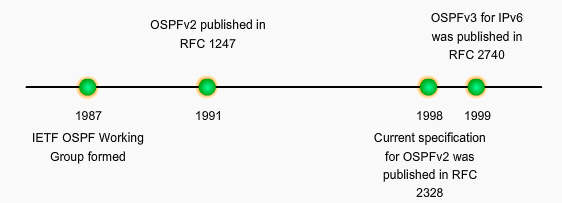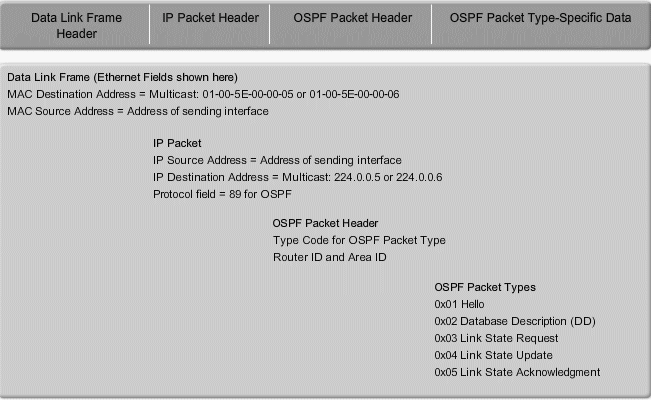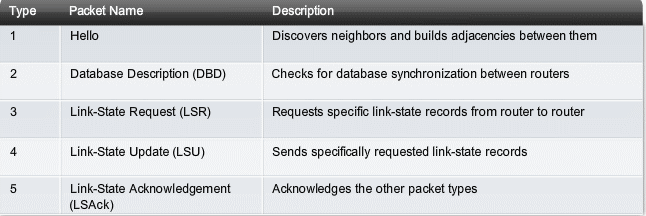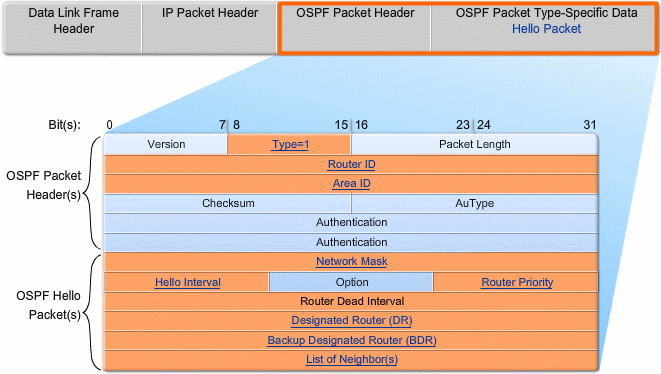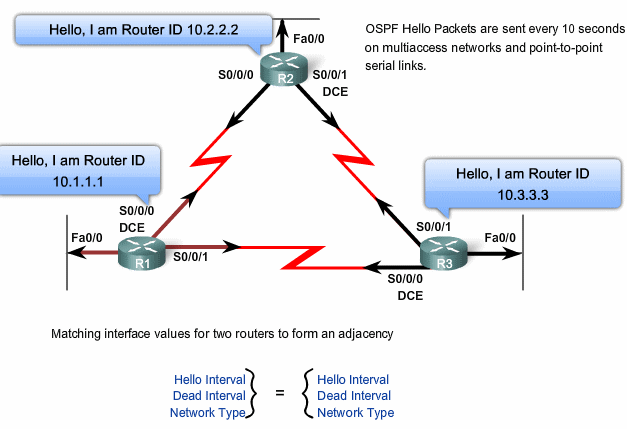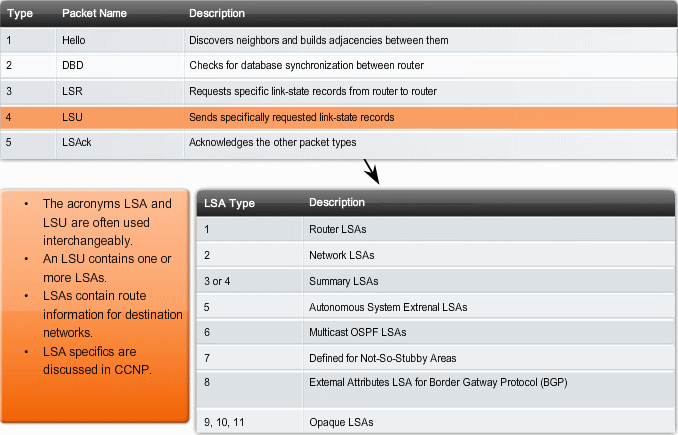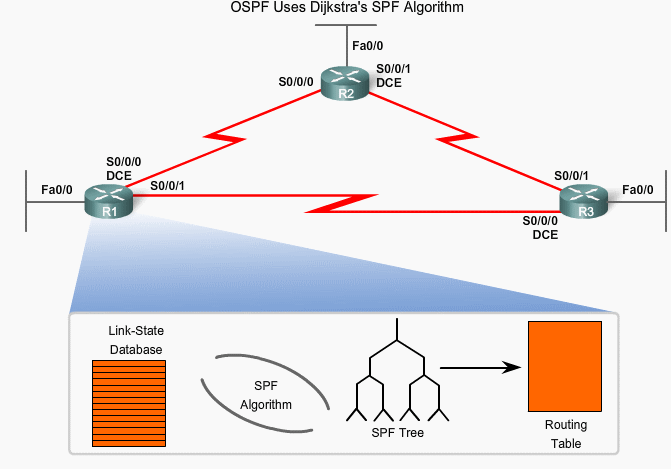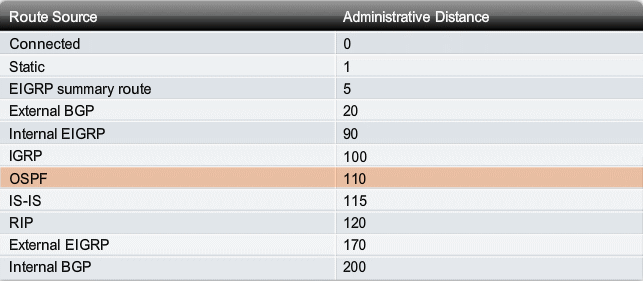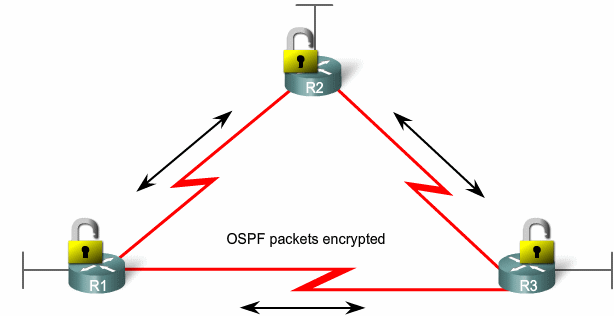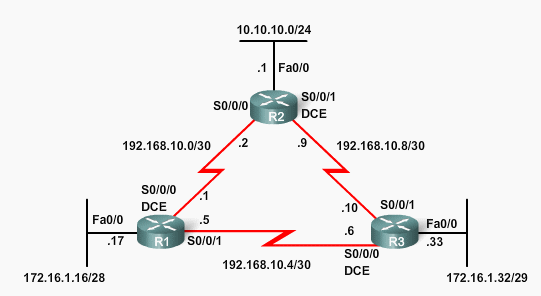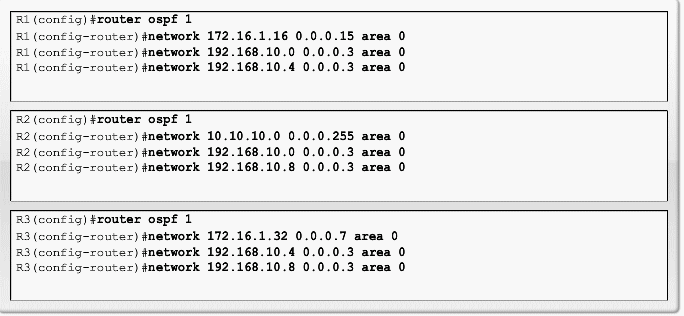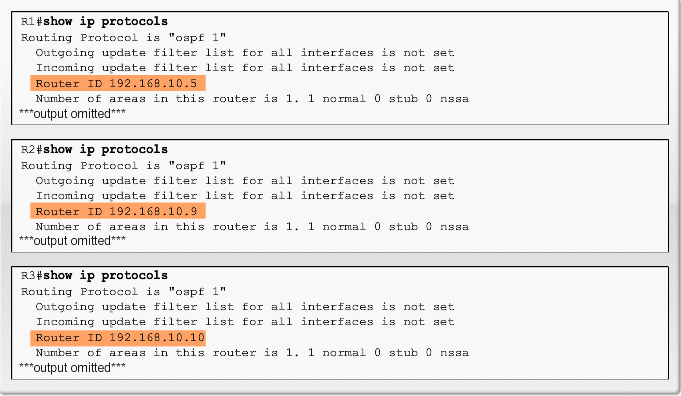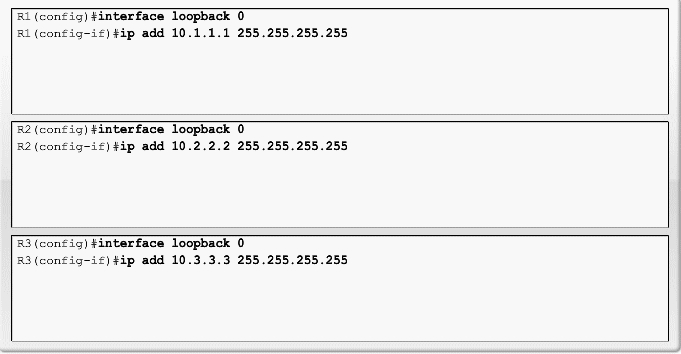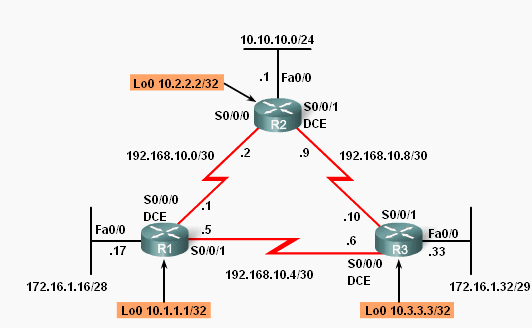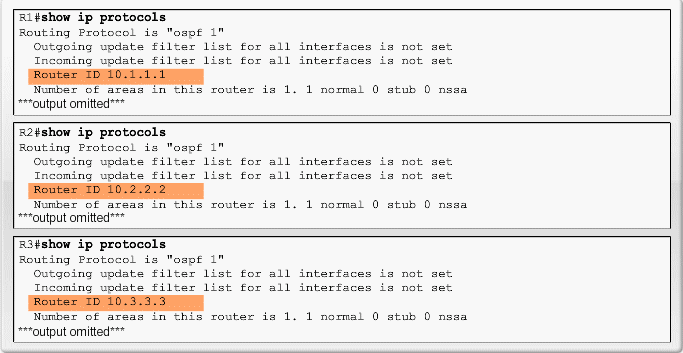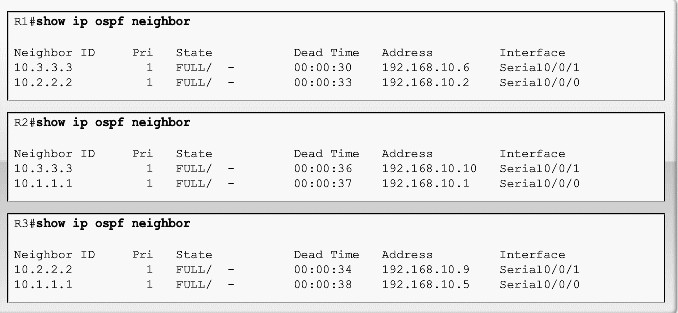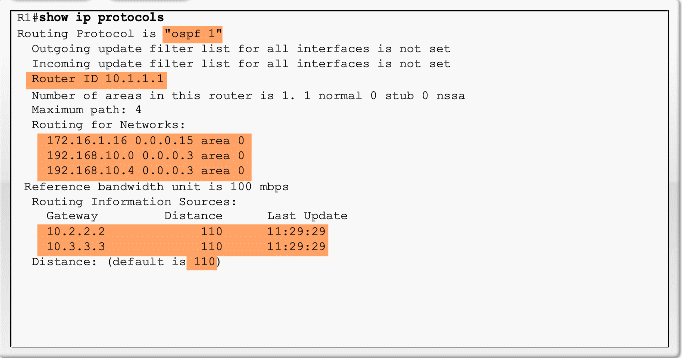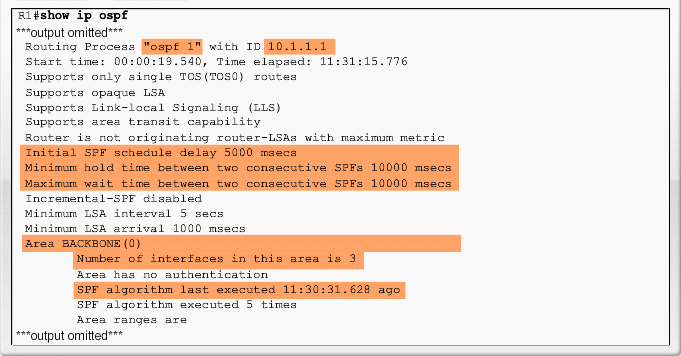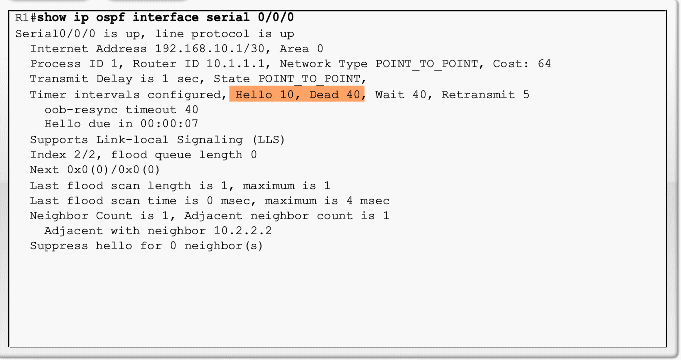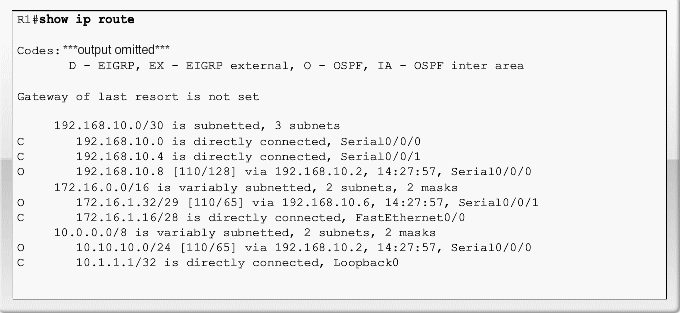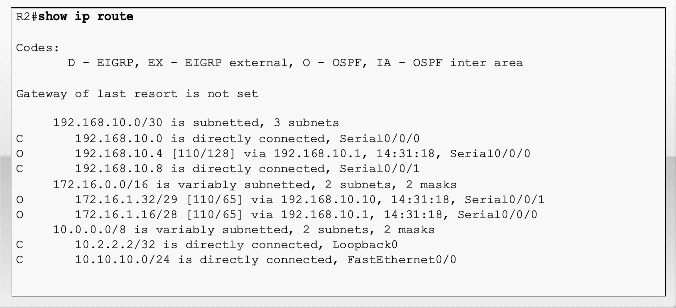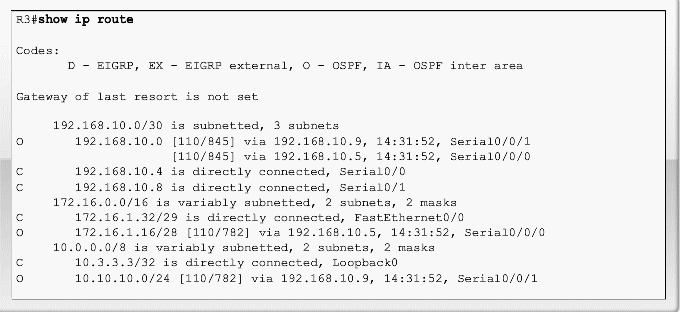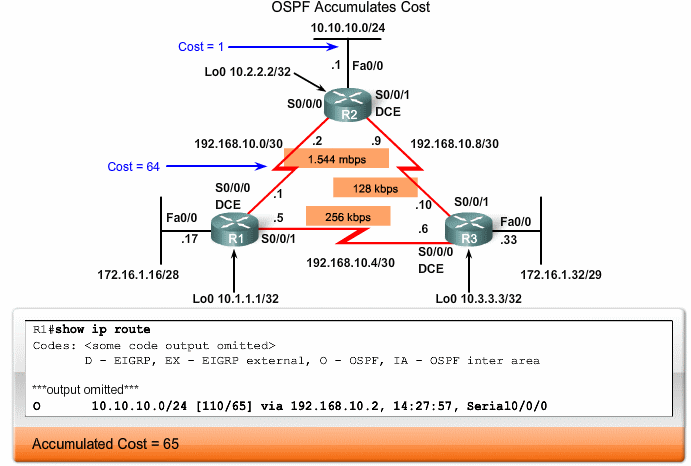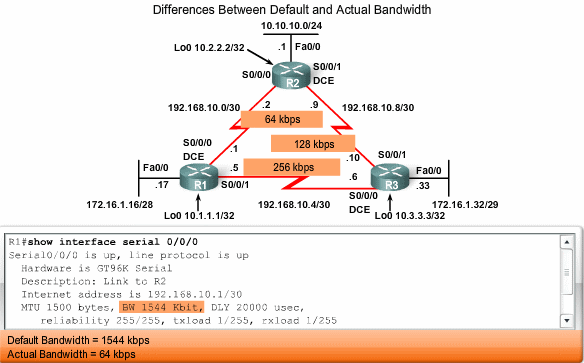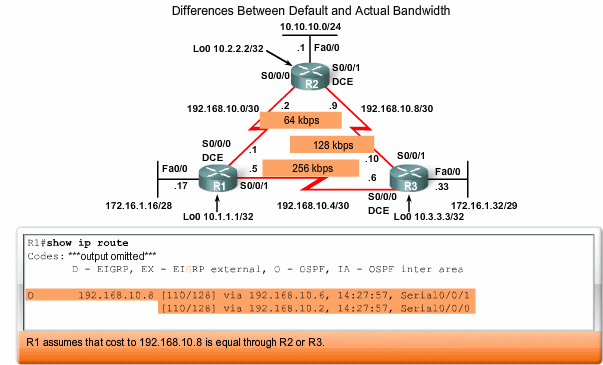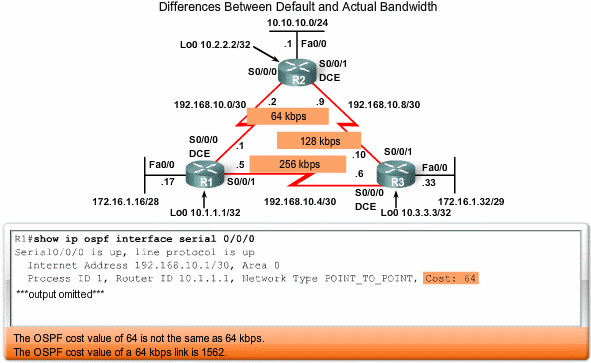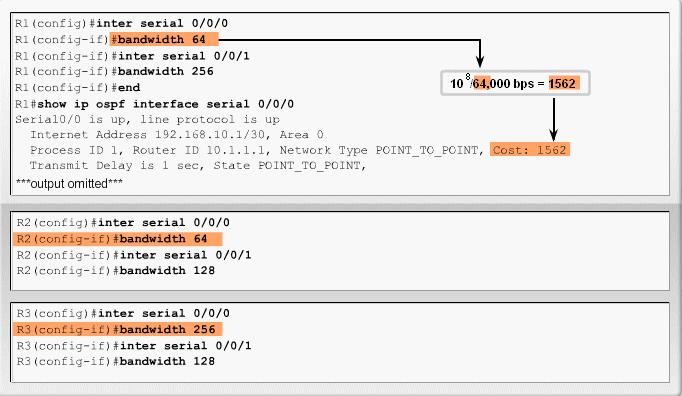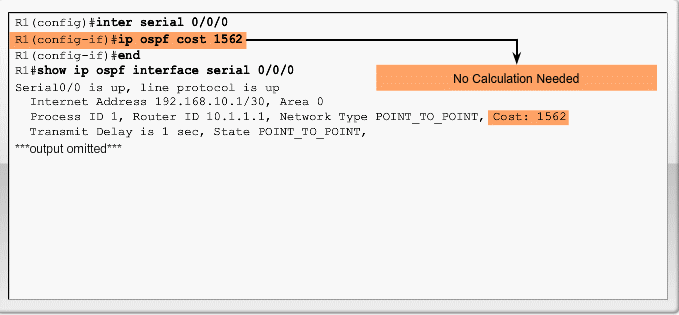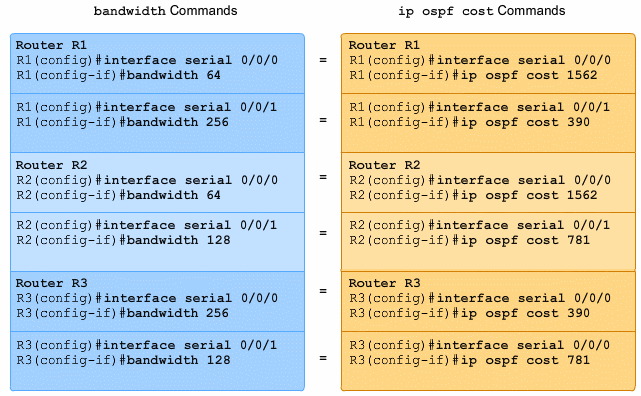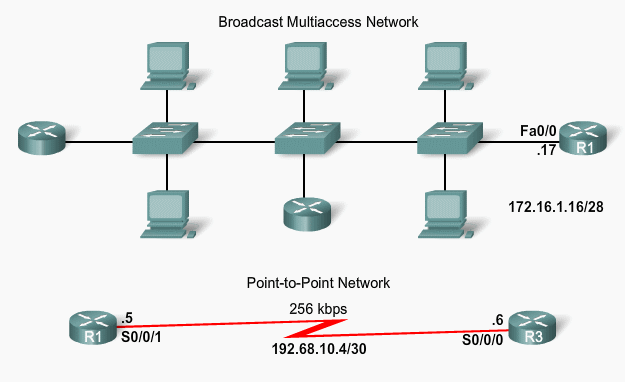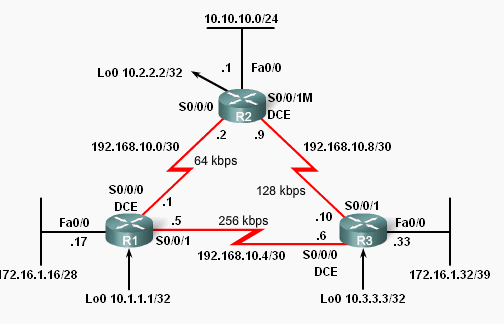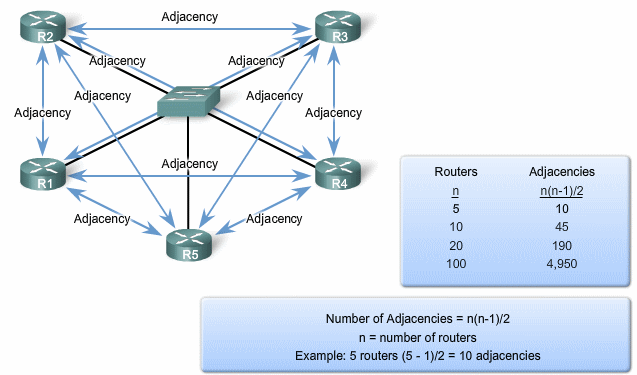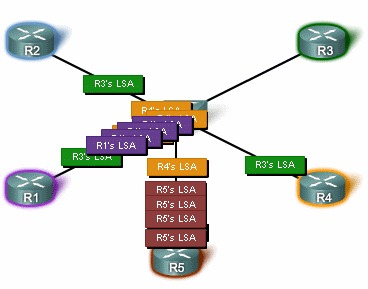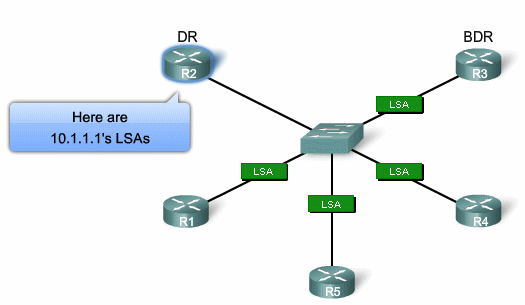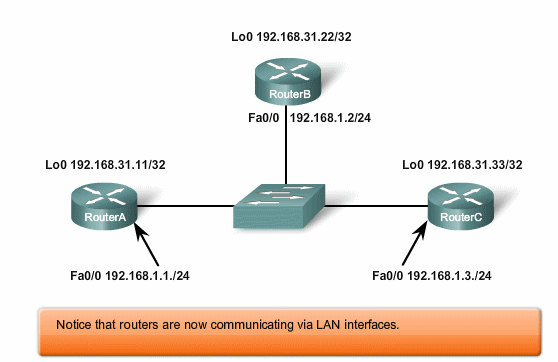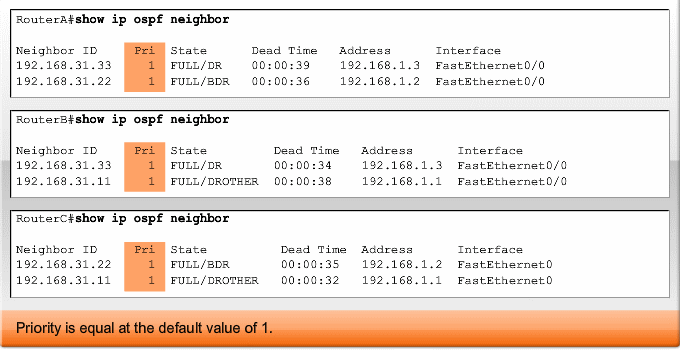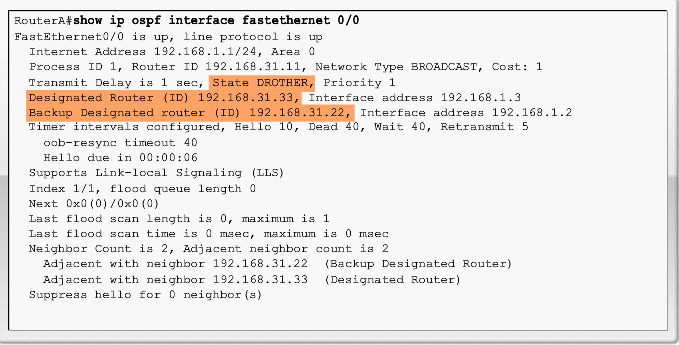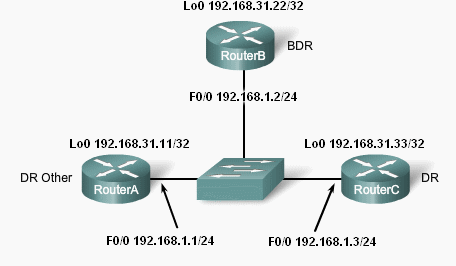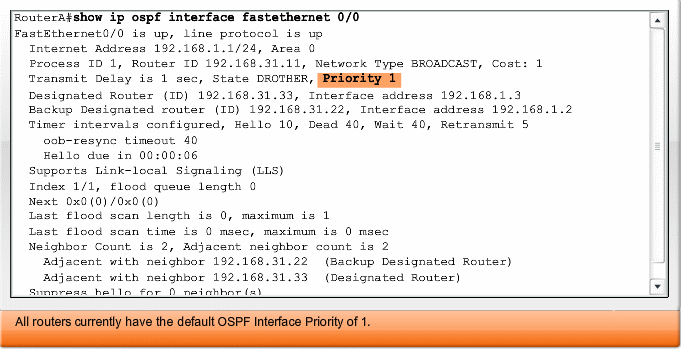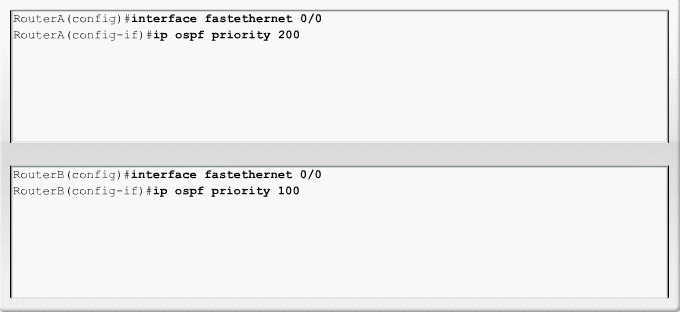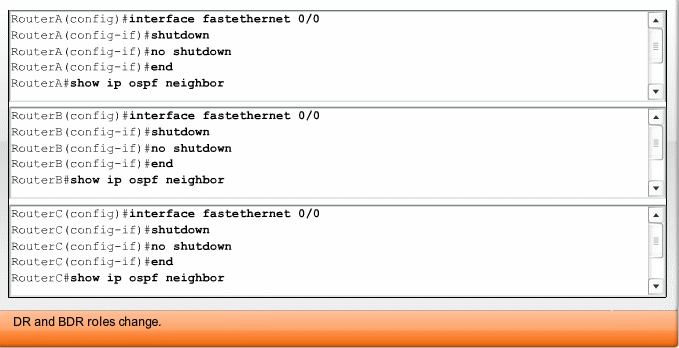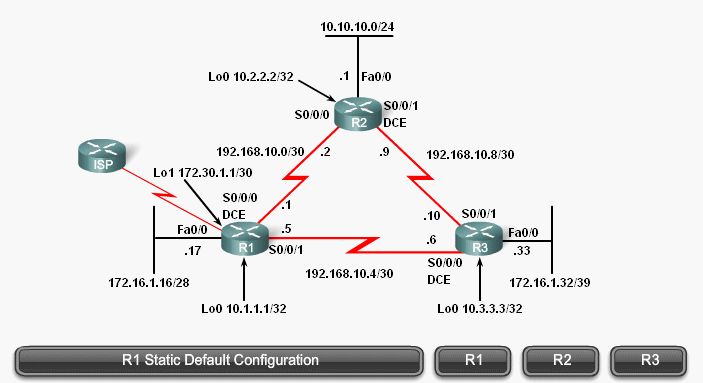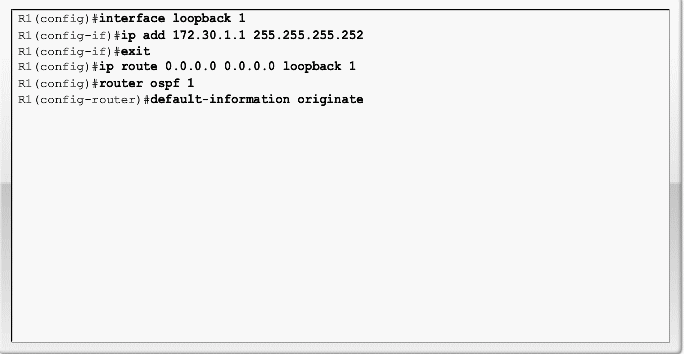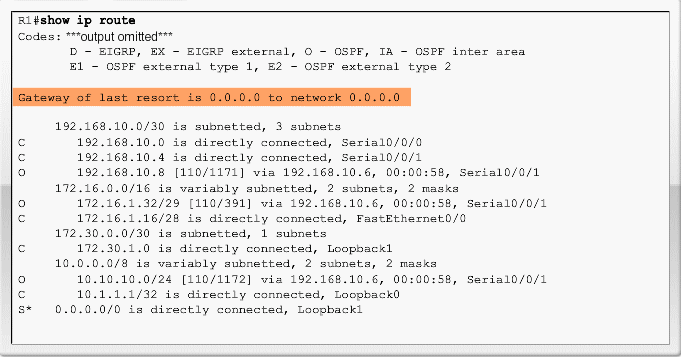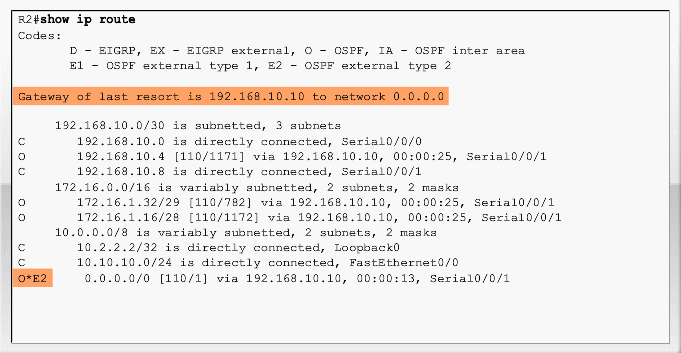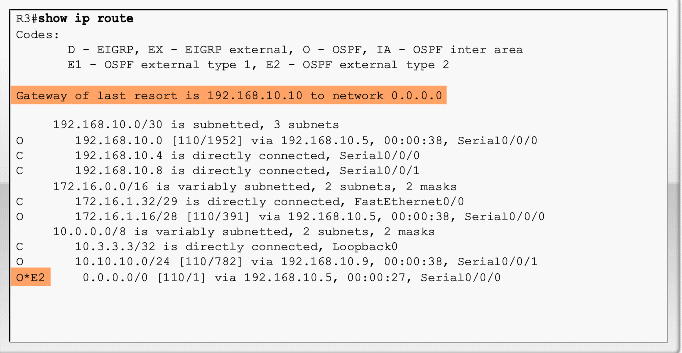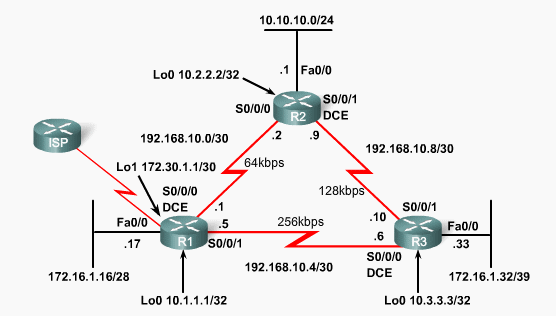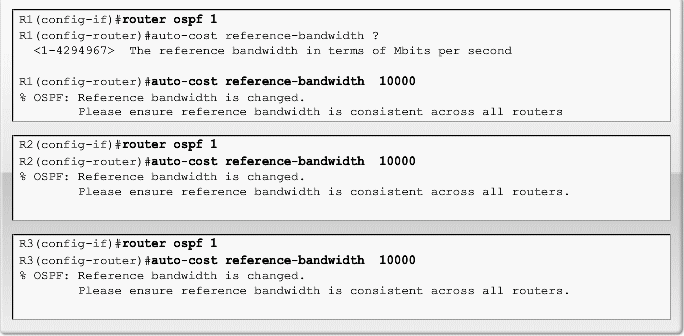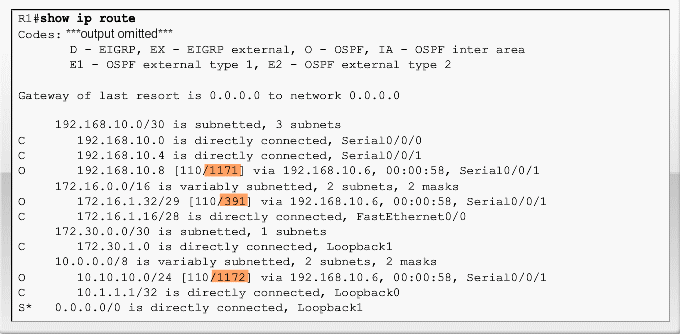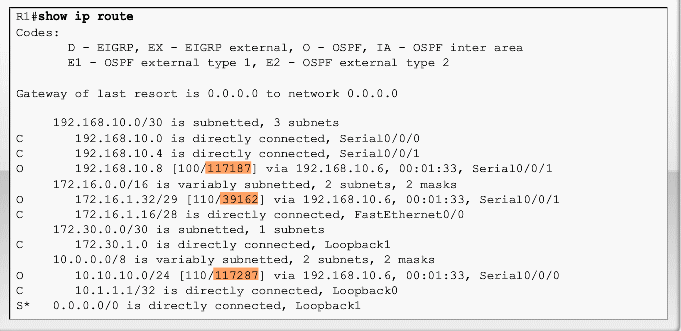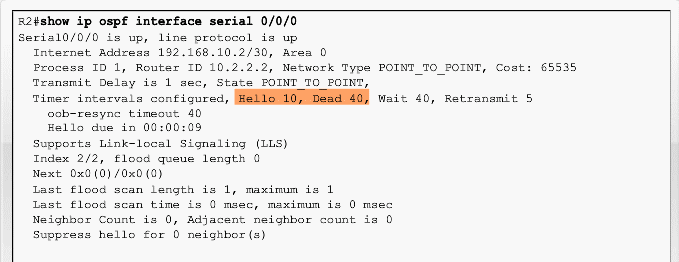Difference between revisions of "CCNA Explorer semester 2 kapitel 11"
m |
m |
||
| (7 intermediate revisions by 2 users not shown) | |||
| Line 1: | Line 1: | ||
| − | + | {{TOCright}} | |
{| | {| | ||
|[[Image:Ccna explorer 2 chap 11 1.gif|800px|left|thumb|OSPF udviklings tidslinie]] | |[[Image:Ccna explorer 2 chap 11 1.gif|800px|left|thumb|OSPF udviklings tidslinie]] | ||
| Line 64: | Line 64: | ||
# If the router-id is not configured, the router chooses highest IP address of any of its loopback interfaces. | # If the router-id is not configured, the router chooses highest IP address of any of its loopback interfaces. | ||
# If no loopback interfaces are configured, the router chooses highest active IP address of any of its physical interfaces. | # If no loopback interfaces are configured, the router chooses highest active IP address of any of its physical interfaces. | ||
| + | {| | ||
| + | |[[Image:Ccna explorer 2 chap 11 12.gif|800px|left|thumb|Der er ingen Loopback interfaces konfigureret]] | ||
| + | |- | ||
| + | |} | ||
| + | ==Loopback interface OSPF eksempel == | ||
| + | {| | ||
| + | |[[Image:Ccna explorer 2 chap 11 13.gif|800px|left|thumb|Konfiguration af Loopback interfaces]] | ||
| + | |- | ||
| + | |[[Image:Ccna explorer 2 chap 11 14.gif|800px|left|thumb|Netværks tegning]] | ||
| + | |- | ||
| + | |[[Image:Ccna explorer 2 chap 11 15.gif|800px|left|thumb|Ny Router ID]] | ||
| + | |- | ||
| + | |} | ||
| + | = Verifying OSPF = | ||
| + | {| | ||
| + | |[[Image:Ccna explorer 2 chap 11 16.gif|800px|left|thumb|Verificer OSPF naboer]] | ||
| + | |- | ||
| + | |} | ||
| + | *'''Neighbor ID''' - The router ID of the neighboring router. | ||
| + | *'''Pri''' - The OSPF priority of the interface. This is discussed in a later section. | ||
| + | *'''State''' - The OSPF state of the interface. FULL state means that the router and its neighbor have identical OSPF link-state databases. OSPF states are discussed in CCNP. | ||
| + | *'''Dead Time''' - The amount of time remaining that the router will wait to receive an OSPF Hello packet from the neighbor before declaring the neighbor down. This value is reset when the interface receives a Hello packet. | ||
| + | *'''Address''' - The IP address of the neighbor's interface to which this router is directly connected. | ||
| + | *'''Interface''' - The interface on which this router has formed adjacency with the neighbor. | ||
| + | {| | ||
| + | |[[Image:Ccna explorer 2 chap 11 17.gif|800px|left|thumb|show ip protocols]] | ||
| + | |- | ||
| + | |[[Image:Ccna explorer 2 chap 11 18.gif|800px|left|thumb|show ip ospf]] | ||
| + | |- | ||
| + | |[[Image:Ccna explorer 2 chap 11 19.gif|800px|left|thumb|show ip ospf interface]] | ||
| + | |- | ||
| + | |} | ||
| + | =Route tabellen= | ||
| + | {| | ||
| + | |[[Image:Ccna explorer 2 chap 11 20.gif|800px|left|thumb|R1]] | ||
| + | |- | ||
| + | |[[Image:Ccna explorer 2 chap 11 21.gif|800px|left|thumb|R2]] | ||
| + | |- | ||
| + | |[[Image:Ccna explorer 2 chap 11 23.gif|800px|left|thumb|R3]] | ||
| + | |- | ||
| + | |} | ||
| + | = OSPF Metric = | ||
| + | {| | ||
| + | |[[Image:Ccna explorer 2 chap 11 24.gif|800px|left|thumb|Cisco OSPF Cost values]] | ||
| + | |- | ||
| + | |[[Image:Ccna explorer 2 chap 11 25.gif|800px|left|thumb|OSPF Accumulates Costs]] | ||
| + | |- | ||
| + | |} | ||
| + | == Default bandwidth == | ||
| + | {| | ||
| + | |[[Image:Ccna explorer 2 chap 11 26.gif|800px|left|thumb|Default Bandwidth on Serial Interfaces]] | ||
| + | |- | ||
| + | |[[Image:Ccna explorer 2 chap 11 27.gif|800px|left|thumb|show ip route]] | ||
| + | |- | ||
| + | |[[Image:Ccna explorer 2 chap 11 28.gif|800px|left|thumb|show ip ospf interface]] | ||
| + | |- | ||
| + | |} | ||
| + | === Changing default bandwidth === | ||
| + | {| | ||
| + | |[[Image:Ccna explorer 2 chap 11 29.gif|800px|left|thumb|bandwidth kommando]] | ||
| + | |- | ||
| + | |[[Image:Ccna explorer 2 chap 11 30.gif|800px|left|thumb|ip ospf cost kommando]] | ||
| + | |- | ||
| + | |[[Image:Ccna explorer 2 chap 11 31.gif|800px|left|thumb|sammenligning]] | ||
| + | |- | ||
| + | |} | ||
| + | = Multiaccess netværk = | ||
| + | {| | ||
| + | |[[Image:Ccna explorer 2 chap 11 32.gif|800px|left|thumb|Multiaccess vs. Point-to-Point netværk]] | ||
| + | |- | ||
| + | |[[Image:Ccna explorer 2 chap 11 33.gif|800px|left|thumb|Multiaccess og Point-to-Point netværk]] | ||
| + | |- | ||
| + | |[[Image:Ccna explorer 2 chap 11 34.gif|800px|left|thumb|Antallet af naboer på multiaccess stiger ekspontielt]] | ||
| + | |- | ||
| + | |[[Image:Ccna explorer 2 chap 11 35.gif|800px|left|thumb|Alle skal sende LSA'er til alle (Problem)]] | ||
| + | |- | ||
| + | |[[Image:Ccna explorer 2 chap 11 36.gif|800px|left|thumb|DR og BDR]] | ||
| + | |- | ||
| + | |} | ||
| + | == DR og BDR selection process == | ||
| + | {| | ||
| + | |[[Image:Ccna explorer 2 chap 11 37.gif|800px|left|thumb|Multiaccess netværk]] | ||
| + | |- | ||
| + | |[[Image:Ccna explorer 2 chap 11 38.gif|800px|left|thumb|show ip ospf neighbour]] | ||
| + | |- | ||
| + | |[[Image:Ccna explorer 2 chap 11 39.gif|800px|left|thumb|show ip ospf interface]] | ||
| + | |- | ||
| + | |} | ||
| + | === DR og BDR selection example === | ||
| + | {| | ||
| + | |[[Image:Ccna explorer 2 chap 11 40.gif|800px|left|thumb|Multiaccess netværk]] | ||
| + | |- | ||
| + | |[[Image:Ccna explorer 2 chap 11 41.gif|800px|left|thumb|Router A fastethernet0/0 OSPF priority]] | ||
| + | |- | ||
| + | |[[Image:Ccna explorer 2 chap 11 42.gif|800px|left|thumb|Changing priority]] | ||
| + | |- | ||
| + | |[[Image:Ccna explorer 2 chap 11 43.gif|800px|left|thumb|Forcing election]] | ||
| + | |- | ||
| + | |||
| + | |} | ||
| + | =OSPF redistribute OSPF default Route= | ||
| + | {| | ||
| + | |[[Image:Ccna explorer 2 chap 11 44-2.gif|800px|left|thumb|Netværk med internet adgang]] | ||
| + | |- | ||
| + | |[[Image:Ccna explorer 2 chap 11 44.gif|800px|left|thumb|Konfiguration af R1]] | ||
| + | |- | ||
| + | |[[Image:Ccna explorer 2 chap 11 45.gif|800px|left|thumb|Routetabel R1]] | ||
| + | |- | ||
| + | |[[Image:Ccna explorer 2 chap 11 46.gif|800px|left|thumb|Routetabel R2]] | ||
| + | |- | ||
| + | |[[Image:Ccna explorer 2 chap 11 47.gif|800px|left|thumb|Routetabel R3]] | ||
| + | |- | ||
| + | |||
| + | |} | ||
| + | =Fine-tuning OSPF= | ||
| + | ==Reference bandwidth== | ||
| + | {| | ||
| + | |[[Image:Ccna explorer 2 chap 11 48.gif|800px|left|thumb|Netværk med internet adgang]] | ||
| + | |- | ||
| + | |[[Image:Ccna explorer 2 chap 11 49.gif|800px|left|thumb|Ændring af reference bandwidth]] | ||
| + | |- | ||
| + | |[[Image:Ccna explorer 2 chap 11 50.gif|800px|left|thumb|Routetabel R1 før ændring]] | ||
| + | |- | ||
| + | |[[Image:Ccna explorer 2 chap 11 51.gif|800px|left|thumb|Routetabel R1 efter ændring]] | ||
| + | |- | ||
| + | |} | ||
| + | ==Modifying Timers== | ||
| + | {| | ||
| + | |[[Image:Ccna explorer 2 chap 11 52.gif|800px|left|thumb|R1 naboer 1]] | ||
| + | |- | ||
| + | |[[Image:Ccna explorer 2 chap 11 53.gif|800px|left|thumb|Modify R1 timere]] | ||
| + | |- | ||
| + | |[[Image:Ccna explorer 2 chap 11 54.gif|800px|left|thumb|R1 naboer 2]] | ||
| + | |- | ||
| + | |[[Image:Ccna explorer 2 chap 11 55.gif|800px|left|thumb|R2 timere]] | ||
| + | |- | ||
| + | |[[Image:Ccna explorer 2 chap 11 56.gif|800px|left|thumb|Modify R2 timere]] | ||
| + | |- | ||
| + | |[[Image:Ccna explorer 2 chap 11 57.gif|800px|left|thumb|R1 naboer 3]] | ||
| + | |- | ||
| + | |||
| + | |} | ||
[[Category:CCNA]] | [[Category:CCNA]] | ||
Latest revision as of 05:46, 4 April 2011
OSPF Pakketyper
1. Hello - Hello packets are used to establish and maintain adjacency with other OSPF routers. The hello protocol is discussed in detail in the next topic.
2. DBD - The Database Description (DBD) packet contains an abbreviated list of the sending router's link-state database and is used by receiving routers to check against the local link-state database.
3. LSR - Receiving routers can then request more information about any entry in the DBD by sending a Link-State Request (LSR).
4. LSU - Link-State Update (LSU) packets are used to reply to LSRs as well as to announce new information. LSUs contain seven different types of Link-State Advertisements (LSAs). LSUs and LSAs are briefly discussed in a later topic.
5. LSAck - When an LSU is received, the router sends a Link-State Acknowledgement (LSAck) to confirm receipt of the LSU.
HELLO protocol
- Type: OSPF Packet Type: Hello (1), DD (2), LS Request (3), LS Update (4), LS ACK (5)
- Router ID: ID of the originating router
- Area ID: area from which the packet originated
- Network Mask: Subnet mask associated with the sending interface
- Hello Interval: number of seconds between the sending router's hellos
- Router Priority: Used in DR/BDR election (discussed later)
- Designated Router (DR): Router ID of the DR, if any
- Backup Designated Router (BDR): Router ID of the BDR, if any
- List of Neighbors: lists the OSPF Router ID of the neighboring router(s)
Mismatch OSPF timere
Hvis HELLO interval og DEAD interval ikke er ens på naboerne kan der ikke laves et adjacencie.
Link State Updates
OSPF algoritmen
OSPF eksempel
OSPF Router ID
- Use the IP address configured with the OSPF router-id command.
- If the router-id is not configured, the router chooses highest IP address of any of its loopback interfaces.
- If no loopback interfaces are configured, the router chooses highest active IP address of any of its physical interfaces.
Loopback interface OSPF eksempel
Verifying OSPF
- Neighbor ID - The router ID of the neighboring router.
- Pri - The OSPF priority of the interface. This is discussed in a later section.
- State - The OSPF state of the interface. FULL state means that the router and its neighbor have identical OSPF link-state databases. OSPF states are discussed in CCNP.
- Dead Time - The amount of time remaining that the router will wait to receive an OSPF Hello packet from the neighbor before declaring the neighbor down. This value is reset when the interface receives a Hello packet.
- Address - The IP address of the neighbor's interface to which this router is directly connected.
- Interface - The interface on which this router has formed adjacency with the neighbor.
